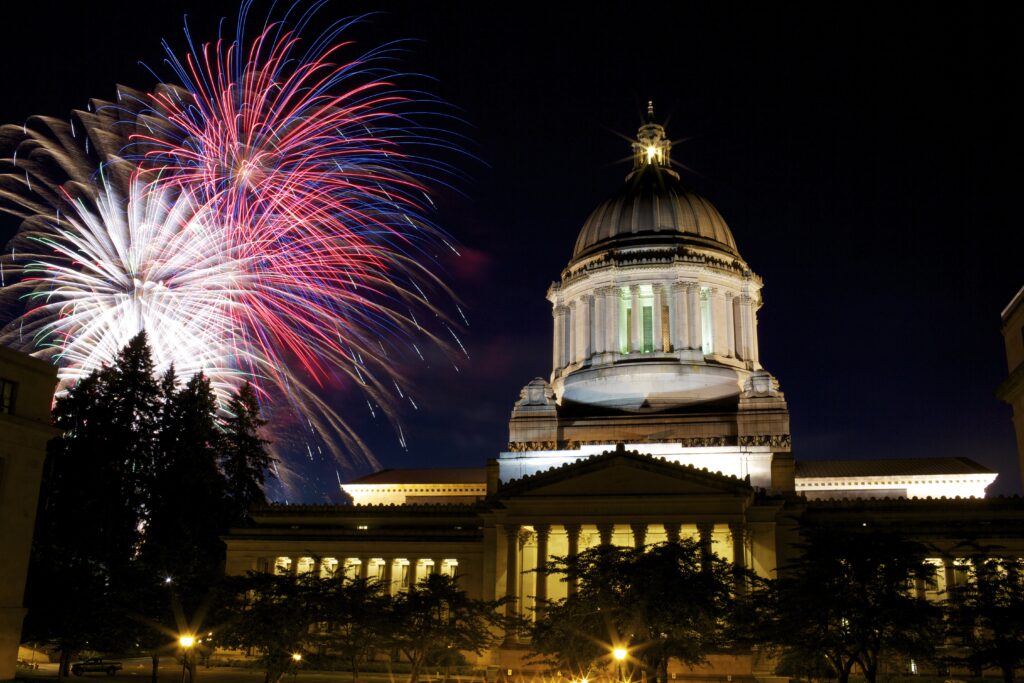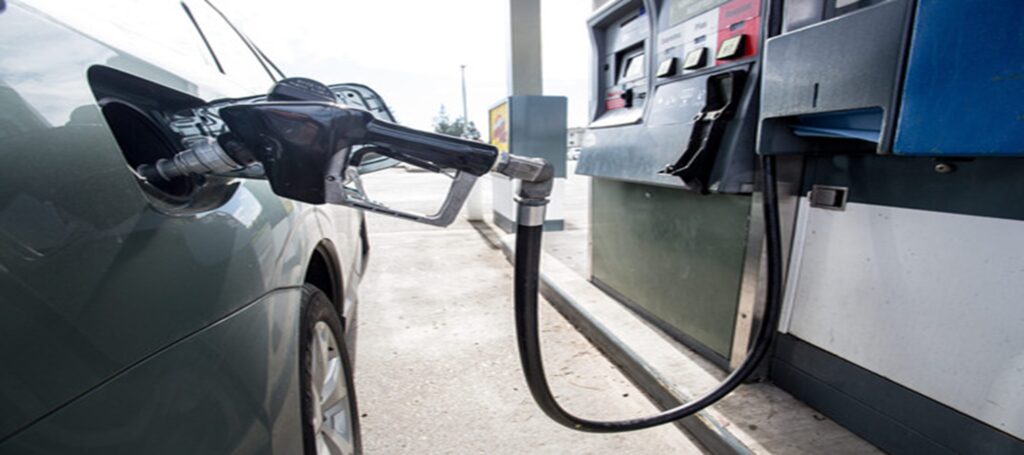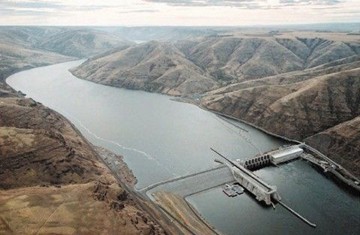Note: The following e-newsletter was sent to Sen. Leonard Christian’s subscribers July 4, 2025. To subscribe to Sen. Christian’s e-newsletters, click here.
Happy Fourth of July!
Finally it’s summer, a time for backyard barbecues and lazy afternoons at the lake. And this holiday weekend, fireworks! For those of us who serve in the Legislature, it’s time for a break as well.
Our 2025 legislative session ended a couple months ago, and by this point, all of us are back home in our districts. Now we get to see what happens when the laws we passed this session start taking effect. And then, when we return to Olympia in January, we can start fixing all the problems they create.
That’s the short version. Of course there are going to be problems. This year’s Legislature passed the biggest tax increase Washington has ever seen and a torrent of legislation to increase the power and authority of state government. If you think everything will go smoothly, you’ve got a lesson coming about how government really works. The good news is that we will have six months to decide how we will deal with the problems we expect as well as the ones we don’t. I certainly hope our decisions next year will be tempered by a greater degree of reality. In this e-newsletter, I’ll tell you a few of the things we know so far.
Revenue forecast nearly puts the state in the red
Our new two-year state budget took effect on Tuesday, July 1, and we very nearly scored a first. Washington very nearly found itself in the red on Day One.
That’s because our majority colleagues didn’t leave much wiggle room in the $77.8 billion state budget they wrote without input from the minority party and passed April 27. They left just $80 million in reserve, a fraction of a percentage point of this year’s budget. Pretty much all of that got wiped out last week.
What happened was that state economists released their latest projection of state revenues. And as everyone expected, it is down significantly from the last one, thanks to a national cooling trend in our economy and the chilling effect of the massive tax increases at the state level. The way these things are calculated is pretty complicated, but the upshot is that we are down $720 million – and we are left with a nice, solid $2 million cushion in the bank.
Now that’s impressive. Our colleagues enacted billions and billions of dollars in new spending this year, and we have a whopping 0.002 percent left over for contingencies. What could possibly go wrong? What do you want to bet we’ll find ourselves in the red when our next revenue forecast arrives in September? What are the chances this will become an excuse for a new round of tax increases next year? Given the mindset of current legislative leadership, we’ll be right back next year to raise taxes again.
Gas taxes going up – and that’s just the start
A six-cent increase in the state gas tax took effect on Tuesday, the first day of the 2025-27 biennium. This heralds a new round of gas-price increases we can expect over the next several years, thanks to this year’s Legislature. Washington’s gas taxes are now the fourth highest in the country, at 54.4 cents a gallon, behind California, Illinois and Pennsylvania. Diesel is going even higher, with a 9-cent increase this week and another 3-cent increase in 2027. What’s more, this year’s Legislature for the first time enacted an “automatic escalator,” an annual two-percent increase for the rest of eternity, starting in 2026 for gas and 2028 for diesel.
But it doesn’t end there. In this state we have a number of taxes on motor fuel that we don’t call gas taxes, for legal reasons. The biggest one is the Climate Commitment Act, a measure that requires refiners to pay for programs that supposedly reduce carbon, with the cost passed on to consumers. The cost of that program is rising quickly, about 46 cents a gallon at present. At the same time, this year’s Legislature ratcheted up the requirements of our state’s nascent low-carbon fuel standards program, doubling the cost. Industry estimates now indicate the cost of this program alone will be $1.44 a gallon by 2035.
Just imagine – if we could just call these what they are, gas taxes, we would have far and away the highest gas taxes in the country. We’re Number One!
- By the way, there’s a reason I said “supposedly” above. A fascinating report from the Department of Ecology indicates that of the $472 million raised by Climate Commitment Act taxes in fiscal year 2024, only 0.1 percent was actually spent on programs to reduce carbon emissions. You might wonder how much carbon that reduced. The departments of Ecology and Commerce are required by law to release reports on that subject. Unfortunately, they have refused to comply with the law, and a citizen lawsuit forcing them to reveal the numbers was thrown out by a Thurston County Superior Court judge last month. The ruling stated that only the governor and the Legislature have the right to demand state agencies follow the law. Since the Legislature passed the law and the governor’s office is among its biggest cheerleaders, likely nobody will take action, and we may never find out if this horrendously costly law is doing any good whatever.
- According to the website GasBuddy.com, which tracks gas prices, Washington is the only state in the country where gas prices are higher now than a year ago.
- One fruit of this year’s gas-tax increase is a pledge by the state to finish the North-South freeway by 2030. I’ll be glad to see it finished, but when you consider how many times we’ve been promised the freeway, it should have been built a dozen times by now. That’s why I voted no on gas taxes. On the other hand, we’re probably going to need that additional freeway capacity for all the people headed to State Line to top off their tanks. Idaho is about a dollar cheaper per gallon, and gassing up over the border makes more sense all the time.
Settling lawsuits costs state a half-billion dollars
Claims against the Department of Children, Youth and Families have sent the state’s tort payouts skyrocketing. This last fiscal year the state set a record – it paid out more than $500 million dollars to settle lawsuits. (Our numbers do not include the final two weeks of the last fiscal year.) This is far and away the biggest claims expense the state has ever faced. Yet our majority colleagues must be expecting to drive this number down to zero in the coming year, because they did not set aside money for future settlements in the new budget.
The truth is, this enormous oversight throws the budget out of balance from day one after all, — it will just take a few months to register. A major contributing factor to this massive increase in payouts is a 2018 change in court policy permitting former foster children to file lawsuits for abuse once they reach adulthood. But it also demonstrates the merit of a proposal Republicans have made for the last several years, to require legislative hearings on any settlement of more than $1 million. If we’re going to be paying this much for misconduct by state officials, the public deserves to know the reason why.
Good news on Snake River dams
The feds are backing off on a vague plan to destroy the Snake River dams for the sake of salmon recovery. Whether this would actually do any good is open to debate, but the idea certainly is a top priority for environmental activists and Indian tribes, and for the politicians who put their interests first. It doesn’t do much for the rest of us who are interested in making sure the power doesn’t go out in a blizzard. These dams have saved our bacon many times, providing just enough power to avoid catastrophic blackouts when power demands are highest. The Biden Administration proudly announced a deal with Northwest Indian tribes in 2023 to work toward the dams’ destruction, and the Trump Administration last month announced just as proudly that it Is reneging.
I’m glad to see it happen. For the last several years, the governor’s office and our majority colleagues have promoted policies to back us into a corner and make dam-breaching all but inevitable, like funding studies about replacing hydropower and barge transportation. The Biden agreement was their biggest victory so far. Its reversal will help ensure stability for the Northwest power grid at a time when we are facing challenges, and it increases the chance we will survive an era of power shortages without major disruption.
Thanks for reading,
Leonard Christian
4th Legislative District
Contact me!
 If you have a comment about state government, or a concern with a state agency, I hope you will reach out to my office. My most important duty is to serve you.
If you have a comment about state government, or a concern with a state agency, I hope you will reach out to my office. My most important duty is to serve you.
Mailing address: Post Office Box 40404, Olympia, WA 98504
Email: Leonard.Christian@leg.wa.gov
Phone: (360) 786-7606
Leave a message on the Legislative Hotline: 1 (800) 562-6000















